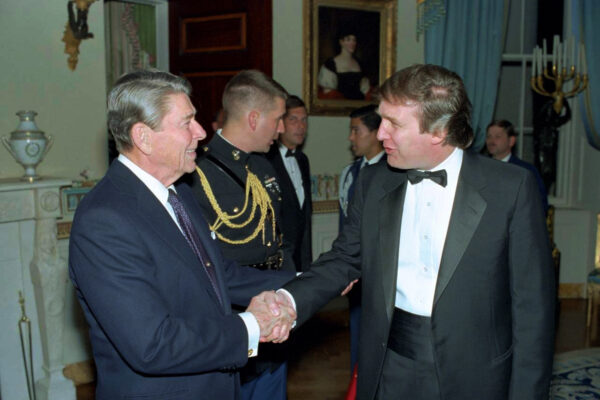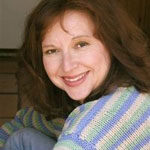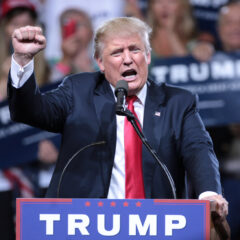This post originally appeared in The L.A. Review of Books.
HOW DID A LYING, philandering blowhard convince millions of Americans — including white evangelicals and the working poor — that he should be their president? I blame Ronald Reagan and the news media. News coverage mainstreamed Reagan’s worldview to elite and middle America, at the same time that televangelists like Jerry Falwell and Pat Robertson preached it to millions of countercultural Christian viewers. Broadcast through both secular and religious media, a conservative perspective on the relationships between God and government, individual freedom and civic responsibility shifted the American religious imaginary — a shared notion of what matters and why — and legitimated the economic policies and political practices that gave rise both to Donald Trump and to the citizenry that supports his candidacy.
I use the term religious imaginary to refer to the religious stratum of what Charles Taylor calls the social imaginary, that is, the ways “people imagine their social existence, how they fit together with others, how things go on between them and their fellows, the expectations that are normally met, and the deeper normative notions and images that underlie these expectations.” It’s a “common understanding that makes possible common practices and a widely shared sense of legitimacy.” Our seminal religious imaginary, or, more accurately, the one to which most white Americans ascribe, emerged from John Winthrop’s 1630 homily to fellow travelers on the Arbella. “A Model of Christian Charity” is usually remembered for its invocation of “a city upon a hill,” and for almost four centuries, pundits and politicians have used the phrase to remind Americans of their providential calling. But Winthrop’s shipboard audience was as concerned with financial prosperity as religious freedom. As Sacvan Bercovitch notes in a 1998 lecture, many “came to the New World at a time of severe economic depression in England, not only as rebels against Anglican rituals, but equally as youngish (thirty-something on the average), ambitious, mobile professionals who had been enticed by the promises of a chartered profit-seeking corporation.” Accordingly, Winthrop began by reminding listeners that God had good reasons for creating inequities in wealth, power, and social station. His saints were not responsible for making everyone equal, but rather for extending justice, mercy, and, whenever possible, economic assistance. (But only after one’s own material security was assured.) Winthrop’s charge laid the groundwork for a holy society that bound citizens in Christian love in order to serve God, watch over one another, and pursue financial rewards. The American religious imaginary, then, underlies the conviction in America’s uniqueness and in personal freedom. Yet the manner in which those beliefs are engaged and enacted has shifted over time.
Before the Reagan revolution, the United States’s religious imaginary tilted to a Rawlsian liberalism that justified first the welfare state and, later, a Great Society. But the social and cultural upheavals of the 1960s, followed by the cataclysms of the 1970s (from Vietnam and the oil embargo to the Iranian hostage crisis and stagflation), doomed that expansive outlook. What Jimmy Carter called “malaise” was actually the disintegration of the “common understandings” that inclined citizens to care for their neighbor, trust in their government, and believe in a beneficent universe. In 1980, candidate Ronald Reagan offered voters a new vision that affirmed the rightness of faith, the wrongness of Communism, and the importance of free markets and limited government. At the heart of this Reagan-tweaked imaginary was the conviction that the United States is an exceptional country because it is God’s chosen nation, and where freedom is the divinely ordained human condition. The former justified unilateral action on the global stage, while the latter asserted the sanctity of the individual, made in God’s image, as a free agent. Freedom is more than an existential notion; it is embodied in the political freedom of democracy, the spiritual freedom of religious liberty, and the economic freedom of free markets and limited government. The entwining of religious and political freedom was written into the First Amendment, but a full-throated religious rationale for free markets and small government is more recent. Beginning in the 1920s, with works such as Bruce Barton’s The Man Nobody Knows (1925), clergy and businessmen promoted the idea, but it was not widely disseminated until the 1970s, when the evangelical mass media made it axiomatic via radio and television.
Reagan, a Christian believer, likewise assumed Biblical support for free markets and limited government, as well as for personal responsibility and social conservatism. The flip side to his commitment to democracy was his aversion to godless Communism. Following the 1980 election, Reagan mainstreamed this religio-political vision through speeches and interviews that wove current events into narratives that reflected his worldview. The news media, bound to cover the commander-in-chief, reported his positions as objectively as possible. Even when editorialists disagreed, they restated Reagan’s narratives, normalizing them through repetition. Mainstreaming particular positions, however, could not in itself produce lasting political change. That change would require a new understanding of the American religious imaginary, which tied political, social, and economic issues to a divine plan. The Reagan-inspired imaginary did just that, and also resonated with diverse publics. Libertarians and political conservatives agreed that Americans needed to be free while many of the faithful believed that God’s people should be strong, successful, and self-sufficient.
…
Click here to read the full article.
Photo by Wikimedia Commons.
Diane Winston is a university fellow with the USC Center for Religion and Civic Culture.





